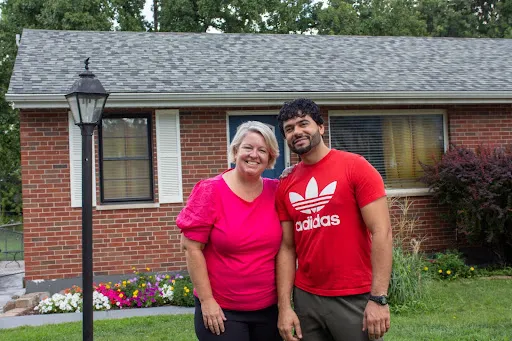
St. Louis, Mo., Aug 22, 2022 / 08:00 am (CNA).
By the time the Taliban captured Kabul at the end of August 2021 and began ruling with oppression, hundreds of thousands of men, women, and children had fled the country, many seeking a new life in the United States.
A stay-at-home mother of three sons, Ann Wittman, 47, felt that the time was right for her to start doing charitable work full-time. As exhausted and destitute Afghans began to arrive in her hometown of St. Louis, Missouri, Wittman saw an opportunity to put her Catholic faith into action by extending a hand to the newcomers.
Nearly a year later, Wittman has provided for the Afghan community in ways she could not have previously imagined. She and her husband bought one family a house. She’s given other families donations of large items such as washers, dryers, furniture, and cars.
All of her work helping needy Afghan families, Wittman says, stems from her Catholic faith, and the imperative she learned growing up to treat the poor as if they were Christ himself.
“When we’re helping them, we’re doing it because that’s what Jesus told us to do,” Wittman said. She says she’s been sharing her Catholic faith with the Afghans — all of whom, so far, have been Muslim — and says she has learned a lot about their religion and culture, too.
Wittman told CNA that she has always had a passion for serving others, and credited that passion to her Catholic upbringing, by which she learned the importance of “treating others like they are Jesus.” Still, she said she’s never taken on such a “passionate leadership role “ as she has in providing for the Afghan families.
Despite Wittman’s hard work, the needs aren’t going away — they’re getting bigger, as more and more Afghans arrive in St. Louis. In Missouri, at least 600 have arrived so far and another 750 are expected later in the year, with many settling in the state’s largest metro area.
Through the community organization Welcome Neighbor STL, Ann volunteered to get paired with an arriving Afghan family to offer them material assistance and, more importantly, friendship. In Nov. 2021, the Wittmans met the Wardaks, a couple with six young children fleeing for their lives, who spoke no English and were initially placed in a bare apartment. The father, Farid, worked with U.S. forces in Afghanistan, necessitating the family’s flight to safety after the Taliban’s takeover.
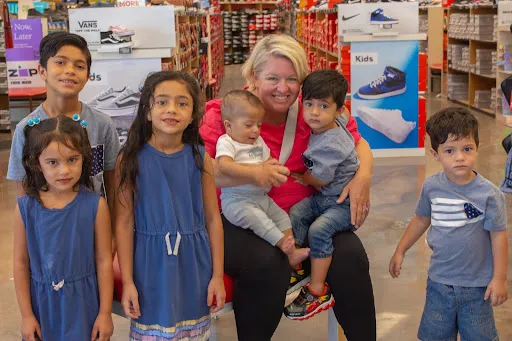
Not content to let them stay where they were, the Wittmans bought the family a house using money from their savings to cover the down payment, and today they collect enough rent from the Wardaks to cover the modest mortgage. Wittman was also able to arrange for the family to get a car, which in turn allows the father of the family, Farid, to get to work every afternoon and to English class twice a week.
Farid hopes to buy the house back from the Wittmans someday when they have the means, but Ann says they’re in no rush. Thanks to their stable housing, their car, and the other necessities the Wittmans have provided for them — as well as to Farid’s hard work — the Wardak family is thriving today.
“They should be the poster child family for success in America,” Wittman said.
Wittman’s assistance was a godsend for the Wardak family, but she didn’t stop there. A year after the fall of Kabul, Wittman has helped over 20 Afghan families, with no plans to slow down.
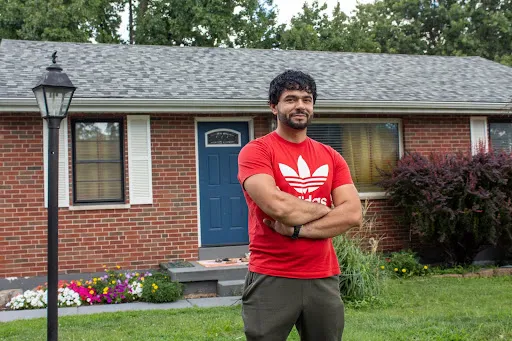
Many left behind
The Taliban began taking over Afghanistan in August 2021 with brutal repression, leading to a massive exodus from the Middle Eastern nation. The Taliban achieved complete control of Afghanistan after the Aug. 31, 2021 pullout by the United States military, and many Afghans desperate to leave remain trapped under the Taliban’s regime. Afghanistan’s small community of Christians, many of whom risked death by converting from Islam, have been particularly at risk.
The Associated Press reported in May that more than 76,000 Afghans have relocated to the U.S. so far, with California and Texas taking in the most people. Congress is considering creating a pathway to lawful permanent residency for the many thousands of Afghan evacuees.
Wittman first got involved with helping the Afghans after seeing a Facebook post from Welcome Neighbor STL asking for volunteers. She quickly learned that Afghans who have been fortunate enough to make it to the U.S. still face significant challenges after arriving: The language and cultural barriers, a lack of money and credit history, and in many cases, a lack of a supportive community.
The fact is, she said, that many Afghan families simply don’t have any of the necessities they need to flourish when they arrive, like furniture and clothing. The city’s official resettlement agency — The International Institute of St. Louis — is unable to provide any help to the families after 90 days, by which point many of them have not yet been able to obtain cars, jobs, or both.
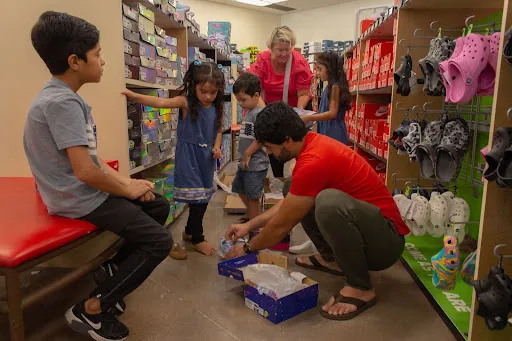
In other words, the resettlement agency was only giving them the very basics needed to survive. What the Afghan families needed, Wittman realized, were friends who could provide help for them long-term. But she also was acutely aware that volunteers can’t be expected to donate enough money for the kinds of big-ticket items that families need to get by in America, like washers, dryers, cars, computers, and Wifi — not to mention other necessary but costly services such as counseling.
Having already spent tens of thousands of dollars of their own money, it was getting to the point where the Wittman family simply could not donate any more than they already had.
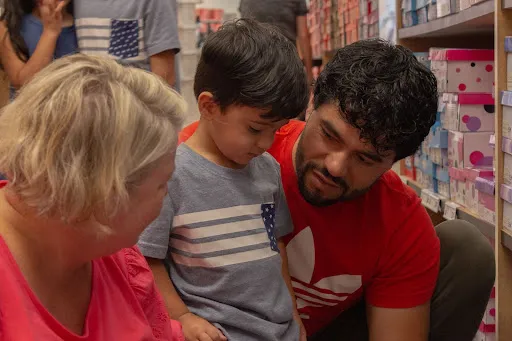
And so Wittman and her cousin Delia Andrews started a nonprofit organization, Human Kind STL, to raise the funds needed to continue their grassroots efforts to help Afghan families arriving in the St. Louis area. They hope that by garnering donations from far and wide, they’ll be able to raise the funds for the items the Afghan families need to thrive.
Wittman has already marshaled her parish community of Holy Infant Catholic Church in Ballwin, Missouri, to join the effort. Her fellow Catholics are “totally on board,” she said, and friends and fellow parishioners drop off donation items with her every day — almost more than she can handle.
One of her present goals is to mobilize other Catholic parishes and schools in St. Louis to fundraise money for their cause, with all the donations flowing through Human Kind STL. Their need for funds is greater than for items, such as clothes or food, she said, because funds allow them to pay for such necessities as car insurance, or Uber rides to help get the Afghans to work until they can work out a permanent transport solution.
Wittman urged people of good will to donate online.
“We know that the money is out there, we’re just trying to spread the word and help raise the money,” she said.
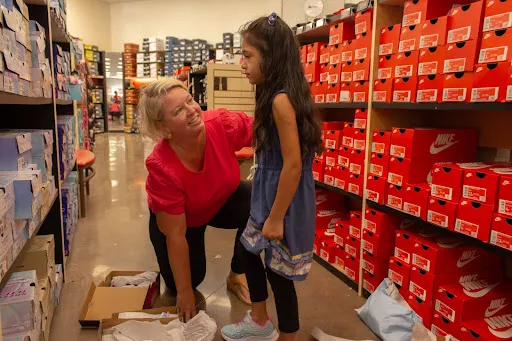
Wittman’s work has attracted the attention of the local archdiocese, which has long been involved in the resettlement of refugees in St. Louis.
Marie Kenyon, director of the Archdiocese of St. Louis’ Justice and Peace Commission, told CNA she “can’t say enough about the work that Ann and her group are doing.”
“Immigrants make up an important part of who we are as a church in St. Louis and in the region, and we welcome anyone who comes to our door asking for help,” Kenyon said.
“Our job in the diocese is to promote their work and to encourage the faithful to join in the work if that’s what they’re being called to do … we’re just trying to be as supportive as we can.”
“Jesus told us that we’re here to help our neighbor”
Wittman often visits the Afghan families she’s helped, since many of them have become her friends.
On a sunny day in mid-June, Wittman sat at her friend Jawana’s kitchen table, which was laden with a hospitable spread of wrapped chocolates, nuts, tea, and brimming glasses of orange juice. Jawana lives with her husband and two children in a humble apartment in the St. Louis suburb of Affton.
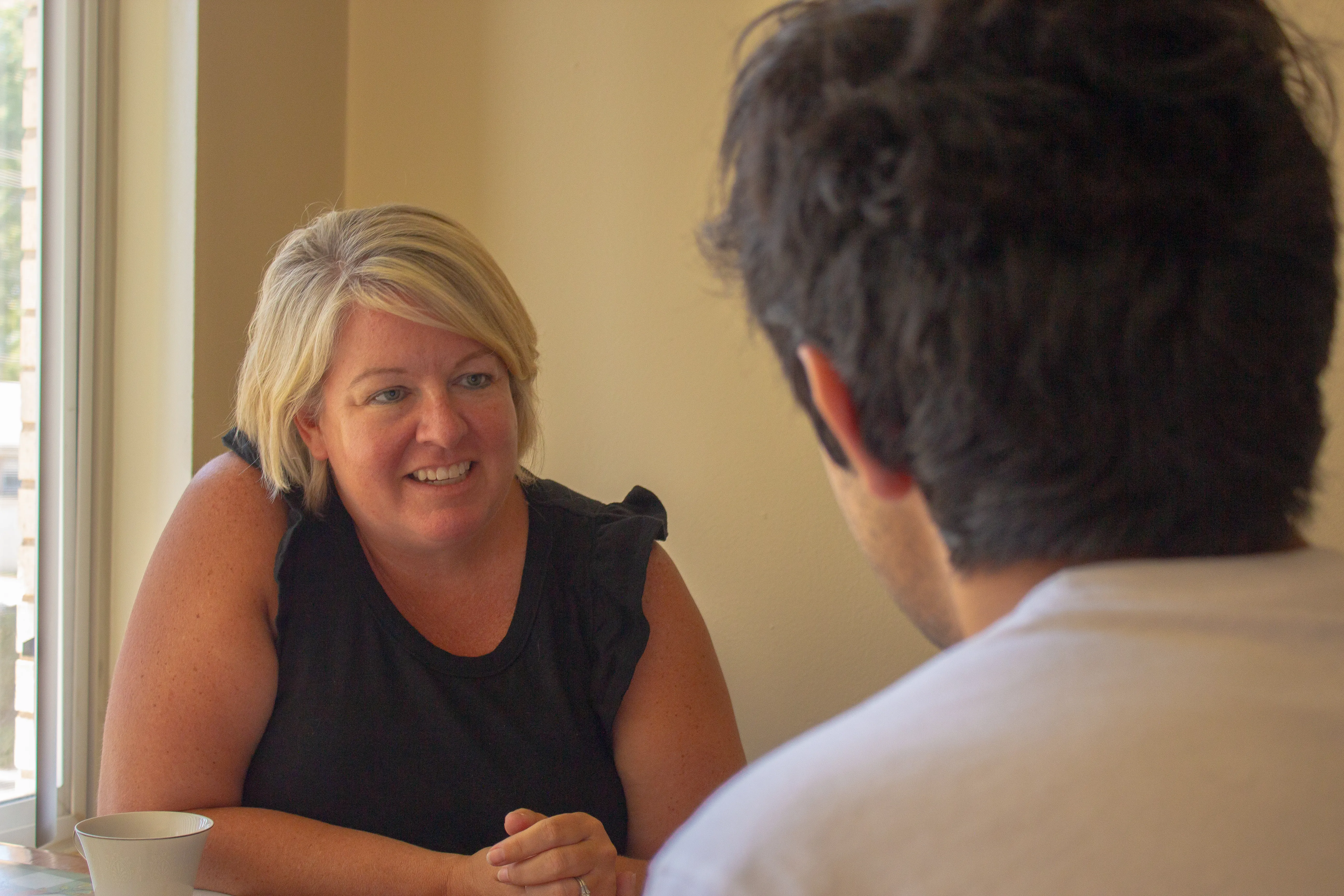
Abdul, an Afghan in his late 20s who lives nearby, was also visiting. Wittman and Abdul shared an occasional laugh as they cordially but probingly questioned each other, sharing insight into one another’s cultures and religions. Wittman’s cousin, Delia Andrews, chatted with Jawana nearby.
At a certain point in their conversation, Wittman explained to Abdul the reason she has worked so hard to assist the many Afghan families arriving in her city over the past year.
“Jesus told us that we’re here to help our neighbor,” she told the young father of two.
In her home country, Jawana was the principal of a school in Kabul. She had money, a close extended family, and a comfortable life — even a nice car and a driver, she said. Opening her smartphone, she flipped to a photo of a family gathering at a table in a flower-filled courtyard, taken on Father’s Day in 2021. Happy faces beamed out from the screen.
Three months later, their happy lives fell apart when the Taliban began to seize control of the country. Fearing for their safety, Jawana had to leave her mother, family, and career to come to the U.S. and start over. Flipping through her smartphone again, she showed a video she took at Kabul’s Hamid Karzai International Airport. In the video, a mass of frightened people streams into the terminal under a blue sky, desperate to leave their homeland.
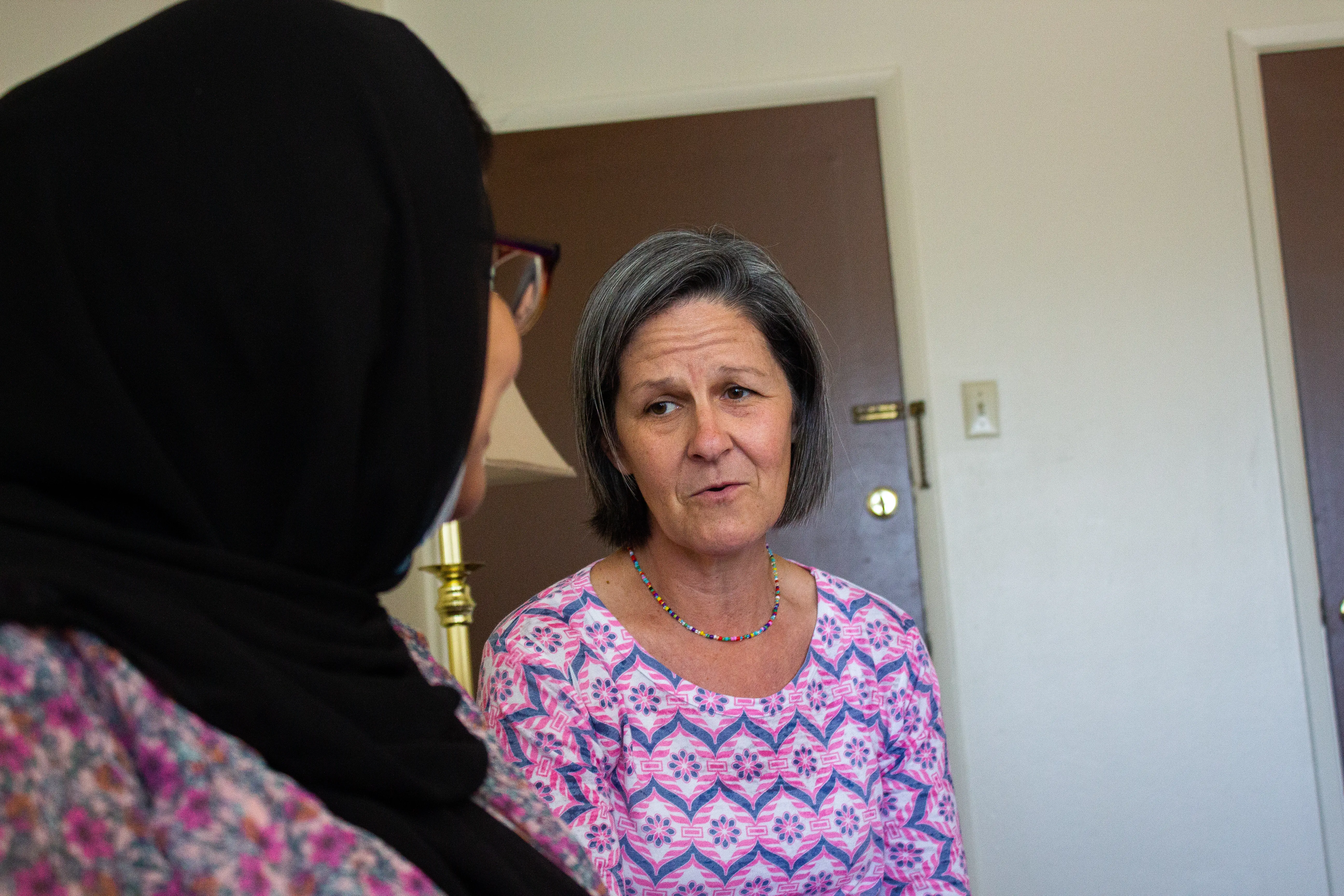
After finally leaving Kabul on August 19, 2021, the family then spent just over two weeks in a refugee camp in Qatar, before finally making it to the U.S. Initially they settled in Kansas City, Missouri, but Jawana chose to come to St. Louis because her husband had a friend here. She and her husband — who now works a blue-collar job in St. Louis — have daughters aged seven and nine years old. Her mother is still trapped in Afghanistan.
Abdul, who previously worked with the U.S. armed forces, says he had always wanted to come to the States — not as a refugee, but as a student. He says he had dreamed for years of coming to the U.S. to study computer programming, and his wish may be about to come true. Abdul will soon start a computer programming course at Washington University in St. Louis, one of the top research universities in the country. In the meantime, he has a job at a local bakery.
Abdul and his family managed to leave Afghanistan on Aug. 25, 2021, and their journey to the U.S. was an ordeal. On their way, they had to spend a dismal few weeks — like Jawana — in a refugee camp in Qatar, and then make a stop in Germany before flying across the Atlantic.
Even upon reaching the U.S., their problems were far from over — around $500 in cash, which Abdul had received as a bonus for his work for the U.S. armed forces, was stolen from his backpack in New Jersey.
Abdul said there was no work to be had whatsoever in Afghanistan when they left, but the Taliban continued to tax and harass the people. Abdul has vivid memories of clashes he personally participated in against the Taliban, particularly the day when the Taliban came to arrest his father. Abdul’s younger brother, who was around 12 years old, was killed in the subsequent firefight.
“I can’t believe I’m alive now when I remember that day,” Abdul says wearily.
Building a community
One of Wittman’s priorities is building a community for the Afghans in St. Louis. Wittman said she knows “dozens of families that want to move” to St. Louis to be close to family, and she’s already paid for several plane tickets to bring Afghan family members to Missouri from places like Texas and North Carolina where they were initially placed. Wittman says a community of friends and family is hugely beneficial for the Afghans’ mental health alone.
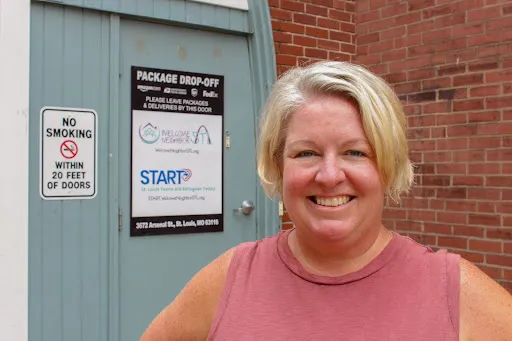
Wittman has spent hours on the phone helping the Afghans navigate the government bureaucracy necessary to get things as simple as identification. She’s highly conscious of the fact that the Afghan newcomers need far more help than they are currently getting from the local resettlement agency, which has suffered from staffing and funding shortages.
“They come here thinking America is going to be welcoming them, the land of the free, the land of opportunity, and then they’re so frustrated.”
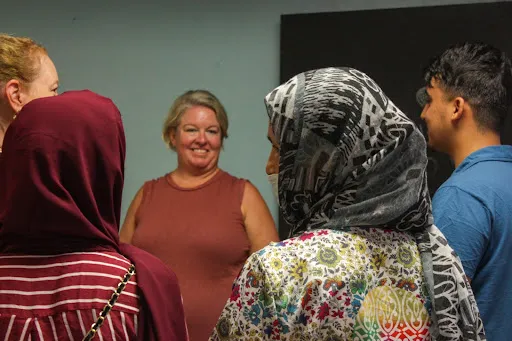
Right now, Wittman’s main areas of focus are housing and transportation. She said even if an Afghan family manages to get into the U.S., decent housing is difficult to come by — most landlords want assurances like a year of rental history and first-month advance payments, which the newcomers are often unable to provide.
Wittman says she has found that landlords who are immigrants themselves are much more willing to be lenient on their rules to get the Afghans housed. St. Louis is home to a large Bosnian immigrant population, for example, and Jawana’s landlord, a Bosnian immigrant, helped her to get accommodated in his building.
Another of Wittman’s priorities is getting cars for the Afghans. Wittman has made partnerships with some local car dealerships, which are informing her when they get a trade-in of a reliable car that they are willing to sell to her for less than $5,000. In addition to that, she’s had more than a half-dozen cars donated already by ordinary people wanting to help the Afghans.
In car-centric America, having wheels is a game changer for the Afghans because it allows them to get to work or the grocery store without having to walk or bike in inclement weather, take unreliable public transportation, or pawn rides off of Wittman or other friends. In addition, having a car gives the immigrants the freedom to take better jobs that are further away from where they live. Abdul’s car was life-changing, Wittman said, because it meant he could accept a better job at the bakery instead of the dismal — but nearby — job he had before.
But since lenders and dealers are often reluctant to give the Afghans a car loan, many of them still haven’t been able to get vehicles.
“How else are they supposed to get a car if we don’t help them?” Wittman said.
Abdul and his family still need help, but he’s reluctant to continue to ask Wittman for help since she’s already done so much. Wittman’s help has inspired Abdul to work hard so he can begin to pay it forward to other people, he said.
“I want to make myself better and better and better, and once I make myself better I want to help people,” Abdul said.
“That’s my hope and my dream.”
If you value the news and views Catholic World Report provides, please consider donating to support our efforts. Your contribution will help us continue to make CWR available to all readers worldwide for free, without a subscription. Thank you for your generosity!
Click here for more information on donating to CWR. Click here to sign up for our newsletter.





Extraordinary. I don’t think I have read of anything quite like it before. It almost comes off as a parody account of Mrs. Jellyby. In the off chance that Ms. Wittman reads this article, I have a couple sets of questions for her:
1. Prior to the arrival of the Afghan refugees, did you ever notice any Americans who were so deserving of your admittedly extravagant generosity? For example, did you ever hear of any families in the St. Louis area with young children that suddenly suffered the loss of a father (and sole bread winner)? Any that were crippled with staggering medical bills? Any that were struggling to pay tuition so that their kids could get a Catholic education? Do you have children or nephews, nieces, or children of friends who are incurring the considerable costs of supporting their families in our high inflation, high tax society? Do you think their our any of your neighbors who would love to be able to get the head’s up on an affordable used car when one becomes available? I can think many other such situations off the top of my head, but perhaps they never occurred to you. Once, the Afghans arrived, however, you couldn’t give your money away fast enough.
2. Just what have you learned about Islam and Afghan culture? Do you have anything notable to share on their views of women, Sharia law, Christianity, democratic government, to mention just a few fairly important areas? How compatible do you think Muslim are with Western society? In particular, have you read much on how well Muslims have assimilated into various Western European countries or even the United States and Canada? If you have, it is rather shocking that you do not evince the slightest concern about what you are helping to import into America.
In the off chance that Ms. Kenyon of the Archdiocese of the St Louis Justice and Peace Commission reads this article, perhaps she could answer how it is that Muslim immigrants become an important part of the Church in St. Louis. There would seem to be a few insurmountable difficulties in making that happen. Perhaps she just spouts nonsense routinely in the expectation that no one really pays serious attention to it in the first place.
Finally, Mrs. Wittman, who does have three children of her own, having perhaps exhausted her own savings on behalf of Muslim immigrants, is not shy about enlisting our support, voluntary on not. I surmise that that is the correct way to interpret the statement on how she helps the new arrivals navigate the federal bureaucracy. I think it’s a safe bet to assume it goes beyond merely getting them identification numbers so that they pay their taxes.
When the heresy of “human fraternity” (a liberal moral error) is exemplified by activists.
Whatsoever you do to the least of my brethren, you do it unto me – says the Lord.